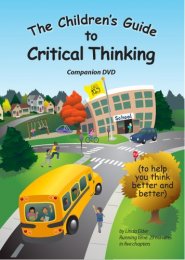
Gain digital access to this and many other resources at the Center for Critical Thinking Community Online!
(Physical copies not available at this time.)
The Children's Guide Companion DVD was created from the Miniature Guide to Critical Thinking for Children.
The book is read aloud while the key ideas and concepts are displayed. An engaging set of backdrops keeps this video entertaining while teaching fairly deep concepts in clear way.
Running time: 23 minutes
This 5 chapter video (web resolution version) is available for review in its entirety below.